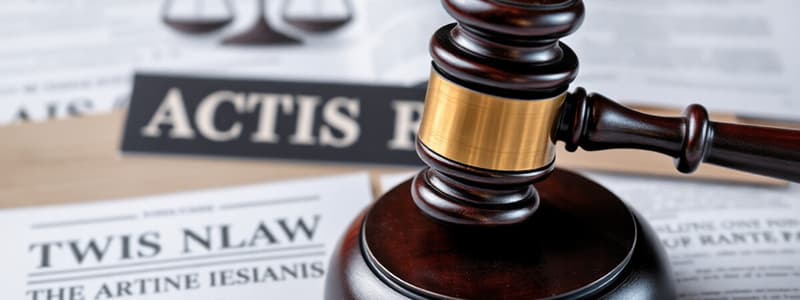Podcast
Questions and Answers
What does equality under the law ensure?
What does equality under the law ensure?
- Only high-status individuals receive fair treatment
- All individuals are treated equally without discrimination (correct)
- Certain individuals are exempt from legal consequences
- All individuals are treated differently based on their status
Which term describes a serious crime that may lead to a significant punishment?
Which term describes a serious crime that may lead to a significant punishment?
- Indictable Offence (correct)
- Regulatory Offence
- Hybrid Offence
- Summary Offence
What is a plea bargain?
What is a plea bargain?
- An agreement to acquit the defendant of all charges
- A negotiation reducing the charges for the plaintiff
- An agreement where the defendant pleads guilty in exchange for a reduced sentence (correct)
- An arrangement where the prosecution agrees to drop all charges
What is mens rea?
What is mens rea?
Which of the following legal provisions allows a government to pass a law conflicting with certain rights?
Which of the following legal provisions allows a government to pass a law conflicting with certain rights?
What is perjury?
What is perjury?
In family law, which matter is generally not included?
In family law, which matter is generally not included?
What does open custody imply for a young person under a court order?
What does open custody imply for a young person under a court order?
What does Actus Reus refer to in criminal law?
What does Actus Reus refer to in criminal law?
Which of the following accurately describes a Conspiracy?
Which of the following accurately describes a Conspiracy?
What is the main focus of Administrative Law?
What is the main focus of Administrative Law?
Which term refers to the process of providing professional advice about legal rights?
Which term refers to the process of providing professional advice about legal rights?
What must be proven to satisfy the Burden of Proof in legal proceedings?
What must be proven to satisfy the Burden of Proof in legal proceedings?
Which of the following best defines Bail?
Which of the following best defines Bail?
What does Constitutional Law primarily focus on?
What does Constitutional Law primarily focus on?
Which term describes the performance of actions without conscious thought?
Which term describes the performance of actions without conscious thought?
What is meant by 'Stare Decisis' in legal terms?
What is meant by 'Stare Decisis' in legal terms?
How does 'Substantive Law' differ from 'Procedural Law'?
How does 'Substantive Law' differ from 'Procedural Law'?
What does the term 'Secure Custody' refer to in law enforcement?
What does the term 'Secure Custody' refer to in law enforcement?
What type of offense does 'Summary Conviction' refer to under Canadian law?
What type of offense does 'Summary Conviction' refer to under Canadian law?
What is the function of a 'Search Warrant'?
What is the function of a 'Search Warrant'?
Flashcards are hidden until you start studying
Study Notes
Accessory
- Someone who, having knowledge, assists in the commission of a crime.
Actus Reus
- The illegal act that must be proven for someone to be found guilty of a crime.
Administrative Law
- Concerns itself with legal rights, obligations, and entitlements.
Arrest
- The act of taking a person into custody.
Automatism
- The performance of actions without conscious thought or intent.
- This is like sleepwalking, for example.
Bail
- A court order releasing an accused person from custody while they await trial or appeal.
- Requires the accused to obey certain conditions while in the community.
- Sometimes includes a money deposit.
Burden of Proof
- The legal standard that requires parties to provide evidence to support their claims in court.
Civil Law
- A body of law that outlines rules for settling disputes between individuals.
Conspiracy
- An agreement between two or more people to commit an illegal act.
- This also requires intent to achieve the agreement's goal.
Constitutional Law
- Focuses on the interpretation and application of a country's constitution.
- Deals with the structure of government, the powers and rights of government entities, and the rights and freedoms of individuals.
Contract Law
- Creates and implements the agreements of a contract.
- Provides a legal remedy if a violation of the contract occurs.
Counseling
- Giving professional advice or guidance, typically by a lawyer or legal expert.
- Helps people understand their legal rights, responsibilities, and options.
Criminal Code
- Defines conduct that constitutes a criminal offense.
- Sets out the punishments for crimes and the procedures for prosecution.
Criminal Law
- A system of law concerned with the punishment of those who commit crimes.
Defendant
- A person or group against whom a criminal or civil action is brought.
Disposition
- A judge's final order in a case.
Due Process
- A legal requirement that ensures all individuals are afforded their full legal rights.
- This includes having a fair trial and the opportunity to present evidence.
Equality Before the Law
- The principle that all people are treated the same by the legal system, regardless of their status.
Equality Under the Law
- All people are treated equally by the legal system, without discrimination.
Family Law
- Deals with family matters, such as divorce and child custody.
Hearsay
- A statement made outside a court that is offered as evidence within a court proceeding.
- It is not typically admissible as evidence.
Hybrid Offence
- A type of criminal offense that can be prosecuted as a summary offense or an indictable offense.
Indictable Offence
- A serious type of crime that is usually dealt with in a trial.
Insanity
- A mental illness or disease that prevents a person from fully understanding their actions.
Lawsuit
- A case in a court of law concerning a dispute between two people or organizations.
- Also called litigation.
Mens Rea
- Refers to criminal intent.
- Must be proven in addition to the actus reus in order to convict someone of a crime.
Notwithstanding Clause
- Allows the government to pass a law even if it conflicts with certain rights or freedoms.
Open Custody
- An Order of the Youth Justice Court that requires a young person to spend the first two-thirds of their term in a facility.
Perjury
- Knowingly providing false information or making a false statement under oath in a judicial setting.
- The intention must be present to deceive the judge or jury.
Plaintiff
- The party who brings a legal action or claim.
Plea Bargain
- An agreement between the prosecution and the defendant where the defendant pleads guilty to charges.
- Usually done in exchange for a lesser sentence.
Precedence
- The principle that a court should follow rulings or decisions of higher courts in similar cases.
Private Law
- Part of a civil law legal system that involves relationships between individuals.
Probation
- The release of an offender from detention, subject to good behavior under supervision.
Procedural Law
- Rules and processes that govern how legal cases are handled in court.
Property Law
- The body of law concerning the rights of individuals regarding land, objects, and expression in Canada.
Rule of Law
- A fundamental principle that asserts all individuals, institutions, and entities are accountable to laws that are equally enforced.
Search Warrant
- A legal document authorizing a police officer or other official to enter and search premises.
Secure Custody
- A minor is locked in a room or enclosure in a law enforcement facility while in temporary custody.
Self-Defense
- Acting, typically using physical force, to protect yourself from a threat.
Stare Decisis
- The principle of following precedent.
Statute
- A written law that is enacted by a legislative body, e.g., parliament.
Substantive Law
- The body of law concerned with rights and obligations.
Summary Conviction
- The least serious type of criminal offense under Canada's Criminal Code.
- Also known as a "petty crime" such as disturbing the peace.
Tort Law
- Provides compensation for people who have been injured or whose property has been damaged due to the wrongdoing of others.
Voir Dire
- The process of questioning potential jurors to determine their suitability for serving on a jury.
- Essentially, a trial within a trial.
Studying That Suits You
Use AI to generate personalized quizzes and flashcards to suit your learning preferences.




